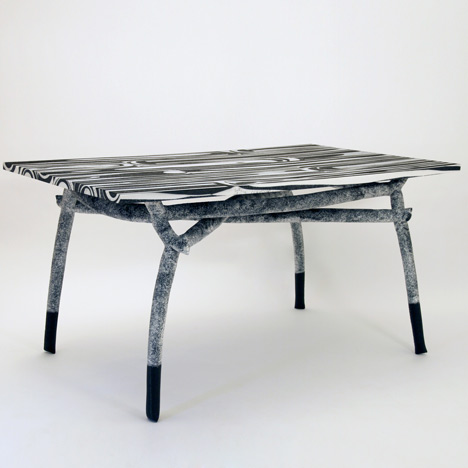Show RCA 2011: Royal College of Art graduates Attua Aparicio and Oscar Wanless have invented a new manufacturing process that involves steaming polystyrene beads inside fabric moulds.
They used the process, called NSEPS (Not So Expanded Polystyrene), to create this range of furniture with sausage-like legs.
Steaming causes the beads to melt, expand and fuse together, distorting their moulds to create writhing muscular shapes.
The designers created a geometric pattern in the table top by fusing different coloured beads and slicing the resulting material to reveal its layers.
Attua Aparicio and Oscar Wanless work together under the name Silo.
More about Show RCA 2011 on Dezeen »
Here are some more details from Silo:
NSEPS (Not So Expanded Polystyrene):
Forming expandable polystyrene in a new way. Making durable structural material suitable for furniture.
The process is simple and works like this: We sew moulds from a textile into which we place raw polystyrene granules. We then steam them for a short period of time. When heated the polystyrene expands and fuses, picking up the detail of the stitch and the grain of the textile. As the polystyrene expands it pushes the mould around, expressing the nature of material giving it a fat and muscular feel. Once cool it sets and we remove the textile mould to expose the pattern and texture of the polystyrene underneath. With this technique we are able to create forms that would not be possible with metal moulds, with tangled bits and parts overlapping. The material behaves in a different way every time making each piece unique.
We use a variety of different coloured granules within the pieces to achieve a noisy pixelated quality, something that is very hard to get in other materials. NSEPS is through coloured so if you cut it the colour and pattern will continue, like a stick of rock, which is roughly how we make table tops.
From the start we saw EPS as an under explored material, often seen engineered in packaging around televisions or as disposable cups; It is rarely seen as primary product. We wanted to try and use the material in a new way, taking it away from the world of disposables and show it in a new light. So after some research and plenty of door knocking, we have tried to learn every thing that there is to know about the moulding of EPS; armed with this knowledge we were then able to take the material to the edge of its possibilities.
We have come a long way from the beginning: from moulding small objects in a saucepan, inside a sock to building our own steamer in which we can make full size furniture in one go. We are now able to control the temperature closely, treating the polystyrene much like ceramics in a kiln, bringing the heat up and down carefully at different stages to get the desired effects.
We design the form to give it a dark but playful quality. The forms are emotive, quite limb like, which is something we choose to embrace. We want furniture and the spaces we use to be more expressive of us and of our personalities.
Silo is a research and design studio formed by Attua Aparicio and Oscar Wanless whilst at the Royal College of Art on the Design Products Course. The core of Silo's work is to look at industrial processes and materials, bringing them into the studio to develop. By embracing a hands-on approach we are able to discover possibilities that the production line does not see.

